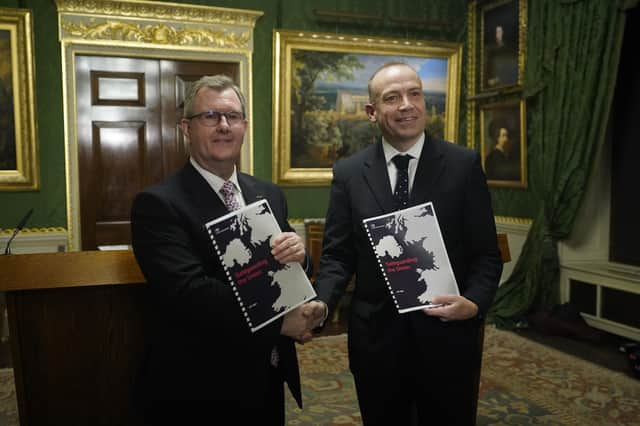Owen Polley: Picking apart bold claims made about a poor deal does not amount to ‘wrecking’ it


We’re encouraged, in theory, to read the relevant documents, digest the reports of their contents and celebrate their effects on Stormont. But we’re not supposed to look too closely, because the facts of the agreement don’t match up to the claims made by Sir Jeffrey Donaldson and Westminster ministers.
To peer into this bargain’s nooks and crannies, the received wisdom suggests, is to be negative, to stand in the way of progress or even to ‘offer nothing’, which has become a blanket insult flung at its critics.
Advertisement
Hide AdAdvertisement
Hide AdThis attitude was epitomised by Doug Beattie last week, when he urged the government to get the assembly back soon, because, “If we leave it too long people will start to try and pick at the deal.”
And ‘picking at the deal’ was already a tricky pastime, because it was presented in a way that deliberately hid more than it revealed.
To that purpose, we had at least three separate accounts of the arrangements that were agreed last week.
Sir Jeffrey Donaldson’s version seemed relatively modest when he wrote an article for the News Letter in Wednesday’s paper, but, by the time he appeared on Radio Ulster later that day, his claims had become distinctly bolder.
Advertisement
Hide AdAdvertisement
Hide AdMeanwhile, the government presented its interpretation in a ‘command paper’, called ‘Safeguarding the Union’. This document, including its title, was a sales-pitch, full of adjectives, superlatives and implied promises rather than detail.
Indeed, many of its assertions, and the language it used, were strikingly similar to the contents of the Windsor Framework.
The most important version of the deal, which will also be the least read, was made up of draft laws and regulations that the government published and passed through parliament at dizzying speed, before MPs had a chance to digest their contents.
It would take a team of lawyers, never mind politicians or journalists, weeks to read, compare and analyse all three versions.
Even so, some examples of overselling appeared immediately.
Advertisement
Hide AdAdvertisement
Hide AdFor instance, Sir Jeffrey’s most striking claim was that the deal ends the Irish Sea border and removes checks on British goods coming into and staying in Northern Ireland, by replacing the ‘green lane’ with a ‘UK Internal Market System’.
That interpretation rested on two completely exaggerated assumptions.
Firstly, it assumed that nearly all goods coming into Northern Ireland from GB would be deemed ‘not at risk’ of entering the EU. Previously, goods were deemed automatically ‘at risk’ of entering the single market unless they gained a specific exemption.
Throughout the Irish Sea border fiasco, we’ve seen repeated claims from the government that only sensitive items, like exotic animals or weapons, would eventually be subjected to EU checks and documentation. Brussels has never accepted this way of thinking and has consistently blocked attempts to declare products ‘not at risk’. Where is the evidence that anything will be different now?
Advertisement
Hide AdAdvertisement
Hide AdThe very idea that the definition of ‘not at risk’ will be expanded implies that some significant goods will still be deemed ‘at risk’. The government claims that at least 80% of trade will pass through the UK internal market system, but that’s just a target, and it excludes things like materials for manufacturing, which it seems will still have to go through the red lane. That is not, by any description, removing the Irish Sea border.
The second assumption involves paperwork. The government’s Safeguarding the Union document and Sir Jeffrey’s interviews claimed that businesses would have to provide only ‘commercial information’ rather than ‘customs information’ to trade with Northern Ireland. It wasn’t clear, though, what this information consists of, how the data will be submitted and whether it makes trade as easy as it was before the protocol.
It’s worth remembering, again, that the Windsor Framework made similar claims about the ability of technology to make the ‘green lane’, as it was called then, almost seamless. They turned out to be grossly exaggerated, and businesses still struggle to get clear information on the systems that were put in place.
There are other glaring issues too. The safeguards to stop Northern Ireland diverging from British regulations are flimsy. Sir Jeffrey says he’s blocked the ‘pipeline’ that brings EU law to Northern Ireland automatically, but the mechanism is just the Stormont Brake that was part of the framework, plus a vague commitment by the government to look at UK legislation.
Advertisement
Hide AdAdvertisement
Hide AdWe’re told that goods that meet British rather than single market standards can be sold in Northern Ireland’s market. The framework made that assertion too, but it turned out that consumer products, as opposed to food and medicines, were not included.
It’s positive, at least, that the command paper is called Safeguarding the Union. It contains a lot of pro-Union language and some ideas to help Northern Ireland play a fuller role in the United Kingdom.
That’s very welcome. But if you were being really cynical, you might say that, from this government, it’s a bit like a serial-abuser putting an arm round his victim and telling her how much he loves her.
It’s certainly a fallacy to allege that highlighting caveats, inconsistencies and uncertainties is ‘wrecking’, ‘carping from the sidelines’ or blocking progress. It’s absolutely fair to criticise the deal because it patently does not meet the claims made of it. Not least, because that lets us know what unionism has not yet achieved and must aspire to achieve in the future.
That task will remain a priority whether Stormont is in place or not.